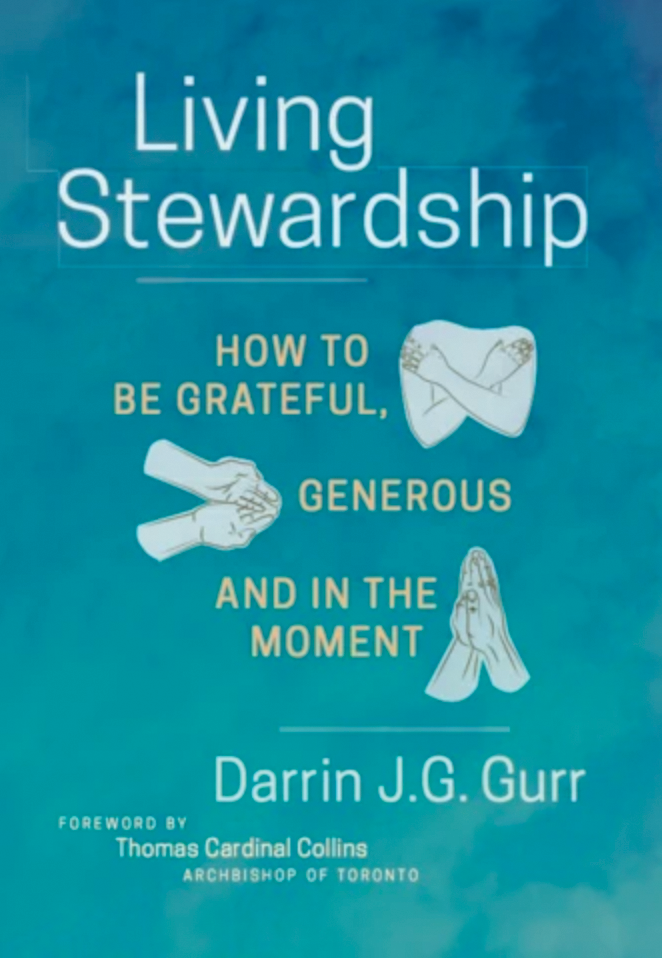
Living Stewardship: How to be Grateful, Generous and In the Moment
by Darrin J.G. Gurr with forward by Cardinal Thomas Collins
Novalis, 64 pages, softcover, $13.95
With gratitude, generosity and mindfulness as his three foundational pillars, Fr. Darrin Gurr wants to examine a spirituality of stewardship. The result is a helpful guide to those who want to find meaning in acts of generosity, but the book lacks originality and some of its themes remain undeveloped.
Gurr does not connect his three pillars. How do each of these inspire and evoke the others? Perhaps feelings of gratitude lead one to be generous and generosity, in turn, makes one more mindful. The author hints at such a connection, but nowhere does he treat it at length. His attempts to explain the role of God’s grace in human stewardship are vague.
At the beginning, he points out that individualism stifles generosity. According to Gurr, individualism means taking sole responsibility for one’s successes and failures. Contrastingly, generosity flows from the realization that God’s providence plays a leading role in those successes and failures. How, though, does that role play out? Gratitude may make one more appreciative of creation, but how does God’s grace help one to be grateful? Such a clarification would require a treatment of divine grace more appropriate to a theological treatise, which this book is not.
It reads more like a homily. It has one of the defining characteristics of all good homilies: it challenges readers. It challenges them to be less consumerist, less individualistic and more self-aware. It challenges them to be better Christians by self-sacrifice and generosity. Yet, as a homily, it is not personal enough. It falls into the same rut as most parish homilies. It teaches, explains and interprets Scripture, but leaves a lot to be desired in terms of faith sharing.
Rather than mere anecdotal snippets from his life, it would have been more effective if Gurr shared his own story of how God’s grace sustained his efforts at stewardship. Such personal sharing models prayerful self-reflection for readers. Since Gurr’s personal story is particular, it would also be new and would have prevented Living Stewardship from coming off as hackneyed.
Gurr points out that humans are made in a generous God’s likeness and the more generous people are, the more God-like humanity becomes. That is not original. It is the same claim most priests make from the pulpit. So why read a book that tells you what you probably already hear on Sunday mornings?
That having been said, the book is both eminently readable and practical. To illustrate his points, the author includes vignettes from his life as a parish priest as well as examples from popular media. He also employs parables. Gurr shows a liturgist’s flair in his use of three American signs as symbols of his three pillars.
As a spiritual text, Living Stewardship’s strength is in the prayers and reflection questions at the end of each chapter. The questions guide readers through an examination of consciousness. In doing so, Gurr encourages the introspection that the three pillars require.
The prayers all start off like the Jewish berakha prayer: “Blessed are you, Lord, God of all creation….” They lead readers into a “berakha spirituality,” acknowledging the primacy of God’s provident presence in all things. The prayers and reflection questions are the glue that holds the text together, inviting readers to discover God’s grace.
It’s a book for those who are looking for a readable and practical guide to prayerfully reflect on their calling to be generous. However, anybody looking for the author to share his own story, or for innovation, or for theological reflection should look elsewhere.
(Vaz is a freelance writer in Toronto.)

